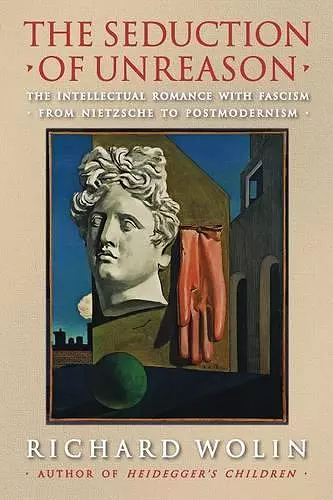The Seduction of Unreason
The Intellectual Romance with Fascism from Nietzsche to Postmodernism
Format:Paperback
Publisher:Princeton University Press
Published:19th Mar '06
Currently unavailable, and unfortunately no date known when it will be back

Richard Wolin's superb book is urgent reading for those who would toss the Enlightenment out with Descartes. In this tour d'horizon, as deep as it iswide, Wolin refuses to be impressed by the glamour of extremity. He shines light into many dark corners where intellectual fraud, self-deception, and hauteur passed for liberty during a murderous century. Talk about genealogy! Unreason will never be the same. -- Todd Gitlin, Columbia University, author of "The Twilight of Common Dreams" Richard Wolin demonstrates conclusively that contempt for liberalism and parliamentary government, whether it comes from the right or the left, whether it is anti-modern or postmodern, is very bad politics. His learned and provocative 'genealogy' of contemporary anti-Americanism should cause deep anxiety among its intellectual purveyors in Europe and here at hometoo. -- Michael Walzer, Institute for Advanced Study I recommend this powerful critique with great enthusiasm. It is that infrequent book that is of enduring scholarly significance while deserving of a broad readership outside the academy. It also offers American readers insights into French and German mentalities at a time of transatlantic irritations. -- Jeffrey Herf, University of Maryland This is a wide-ranging and hard-hitting critique of postmodern thinking--especially of its political limitations and failures--based on broad reading and straight thinking. The author adds relevance to his critique of thinkers by juxtaposing those thinkers with interesting accounts of contemporary European politics. -- Jerrold Seigel, New York University
Revelations about the political misdeeds of Martin Heidegger and Paul de Man sent shock waves throughout European and North American intellectual circles. This title shows that postmodernism's infatuation with fascism has been widespread and not incidental.Fifteen years ago, revelations about the political misdeeds of Martin Heidegger and Paul de Man sent shock waves throughout European and North American intellectual circles. Ever since, postmodernism has been haunted by the specter of a compromised past. In this intellectual genealogy of the postmodern spirit, Richard Wolin shows that postmodernism's infatuation with fascism has been widespread and not incidental. He calls into question postmodernism's claim to have inherited the mantle of the left--and suggests that postmodern thought has long been smitten with the opposite end of the political spectrum. In probing chapters on C. G. Jung, Hans-Georg Gadamer, Georges Bataille, and Maurice Blanchot, Wolin discovers an unsettling commonality: during the 1930s, these thinkers leaned to the right and were tainted by a proverbial "fascination with fascism." Frustrated by democracy's shortcomings, they were seduced by fascism's grandiose promises of political regeneration. The dictatorships in Italy and Germany promised redemption from the uncertainties of political liberalism. But, from the beginning, there could be no doubting their brutal methods of racism, violence, and imperial conquest. Postmodernism's origins among the profascist literati of the 1930s reveal a dark political patrimony. The unspoken affinities between Counter-Enlightenment and postmodernism constitute the guiding thread of Wolin's suggestive narrative. In their mutual hostility toward reason and democracy, postmodernists and the advocates of Counter-Enlightenment betray a telltale strategic alliance--they cohabit the fraught terrain where far left and far right intersect. Those who take Wolin's conclusions to heart will never view the history of modern thought in quite the same way.
"The Seduction of Unreason is a wide-ranging yet subtle consideration of the intellectual's abiding fascination with absolutism, and as such it is a perceptive, compelling and invaluable document. His indignation at the folly and perversity of so many major European thinkers is wholly justified and peculiarly invigorating."--John Banville, The Irish Times "[A] lively, learned, and wide-ranging work... Wolin's subjects have exercised a remarkable impact on certain academic and cultural fields in the U.S. in the last several decades."--Choice "For anyone who has passed through the academic humanities in the last quarter-century and has been exposed to the dubious legacy of postmodernism, The Seduction of Unreason is an indispensable book. It is another important installment in what has become one of the major intellectual enterprises of our time: Richard Wolin's principled defense of liberalism against its most sophisticated enemies."--Adam Kirsch, New York Sun "In this impressive book Wolin does for the Left what Bloom did for the Right; he makes a powerful case for a return to moral seriousness."--Daniel P. Murphy, Magill's Literary Annual 2005 "The topic of Richard Wolin's book is the nexus between postmodernism and politics... Wolin's book raises the right questions at the right time. He forces us to think critically about the deepest philosophical underpinnings of our moral and political ideals. We simply cannot rest content with an unmeasured assault on reason."--Andy Wallace,Ethics "This author's excellent study provides the reader with an informed survey of some of the more important intellectual trends of the twentieth century, employing the writings of a selection of Europe's avant-garde authors."--A. James Gregor, The Historian "Wolin's book will provide much food for thought for the disinterested reader and a veritable feast for critical self-reflection for the post-modern thinker--especially the North American academic who hasn't done his or her genealogical homework."--Jeff Mitscherling, European Legacy
ISBN: 9780691125992
Dimensions: unknown
Weight: 539g
400 pages